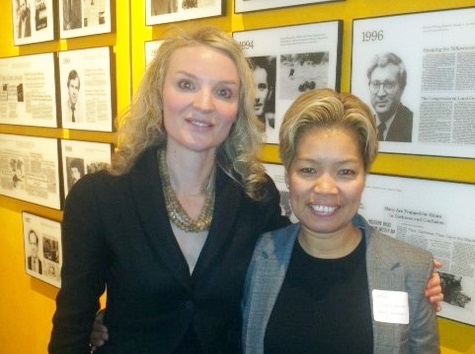By Jane Applegate
Between 1972 and 1975, liberated women embraced the Virginia Slims’ trendy cigarette slogan “You’ve come a long way, baby.”
Forty years later, I’m not so sure we’ve come that far. America’s working women are still making less money than their male colleagues—77 percent to be exact, according to recent economic reports. And, half of the country’s top 100 biggest companies in America still have no women or minorities in senior management positions.
Despite all the legislation, public protests and corporate policies aimed at equalizing disparities between men and women, it appears that we still have a long way to go.
Attending the Impact Leadership 21 Global Summit last week at the New York Times building actually made me feel a bit better about the status of women. IMPACT 21, founded in December, 2012 drew a lively and engaged group of about 200 corporate executives, thought leaders, students and social activists. They spent the afternoon and early evening listening to speakers and discussing how diversity and true equality between men and women benefits both business and society. The conference was sponsored by the Bank of Tokyo Mitsubishi-UFJ, one of Japan’s oldest and largest banks. The conference was moderated by Leslie Grossman, founder of Leslie Grossman Leadership and author of Link Out.
Michaela Walsh, founding president of Women’s World Banking and author of Founding a Movement, urged attendees to take to the streets: “Get on buses…get out there and start demonstrating,” she urged.
Other experts took a less strident approach.
“No country can expect to join the global marketplace if half the population—the women and girls are left behind,” said Alyse Nelson (pictured left), president and CEO of Vital Voices Global Partnership, a non-governmental organization that helps women around the world build schools and supports other ventures.
IMPACT 21 founder Janet Salazar (pictured right), a permanent representative to the United Nations and an executive coach, said she was working at the U.N. in 2006 when she realized that there were only 22 female ambassadors representing the 193 member nations. “There has never been a female Secretary General,” she said. “We need to make a difference at the top.”
The group presented the Frederick Douglass award to Ambassador Anwarul K. Chowdhury, who formerly represented Bangladesh. After accepting his award, he spoke eloquently about his efforts to push the Security Council to formally recognize the contributions women make to the U.N.’s peace-making efforts. It took eight months of intense efforts to get Security Council resolution 1325 passed on Oct. 31, 2000.
“Peace is inextricably linked to equality between men and women,” said Chowdhury. “Collaboration, equality and equal representation is at the core of human progress.”
He also described how he raised the ire of the Japanese government a few years ago by holding a conference to publicize and seek compensation for so-called “comfort women.” These women were often lured by the promise of a job or in some cases, kidnapped from their homes, locked in barracks and forced to have sex with Japanese military officers starting in 1932.
“It was military sexual slavery,” said Chowdhury, adding that some members of the Japanese government still deny the practice. (According to Wikipedia, just prior to and during World War II between 20,000 and 400,000 young women were kidnapped from their homes in China, Korea, Burma and other countries and forced to provide sex to Japanese military men). Unfortunately, investigations by reporters and organizations have revealed that that various forms of sexual slavery is still a serious problem.
Justine Metz, an executive with the Bank of America, said women have to be careful about the companies they work for. She recalled quitting a job at a financial services company shortly after a top executive brought a woman with him to a meeting. The woman sat at his feet shining his shoes as he conducted the meeting. This was not 1952—it was 2002.
Kay Koplovitz, founder of USA Networks, CEO of Koplovitz & Co. and Chairman of Springboard Enterprises, urged participants to help each other be more successful. Springboard helps women prepare to raise venture capital. As Koplovitz said, “We have the power to do everything we want to do.”
Jane Applegate is the national correspondent for SmallBizDaily.com, author of four books on small business success and co-founder of the FabulousFemaleNetwork.com. The Applegate Group is a multimedia production company.







